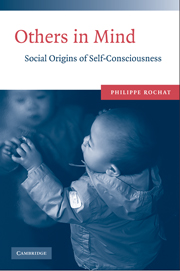Book contents
- Frontmatter
- Contents
- Foreword by Jerôme Bruner
- Preface
- Introduction: Main Ideas
- 1 Self-Conscious Species
- 2 Six Propositions
- 3 Varieties of Self-Reflective Mind State
- 4 Mind States in Development
- 5 Birth of Self-Consciousness
- 6 Shame and Self-Knowledge
- 7 The Roots of Guilt
- 8 Giving and Sharing
- 9 Origins of Owning and Sharing
- 10 Social Construction of Identity
- Conclusion: Moral Space and the Self
- Postscript Note
- References
- Index
Postscript Note
Published online by Cambridge University Press: 05 August 2012
- Frontmatter
- Contents
- Foreword by Jerôme Bruner
- Preface
- Introduction: Main Ideas
- 1 Self-Conscious Species
- 2 Six Propositions
- 3 Varieties of Self-Reflective Mind State
- 4 Mind States in Development
- 5 Birth of Self-Consciousness
- 6 Shame and Self-Knowledge
- 7 The Roots of Guilt
- 8 Giving and Sharing
- 9 Origins of Owning and Sharing
- 10 Social Construction of Identity
- Conclusion: Moral Space and the Self
- Postscript Note
- References
- Index
Summary
Self-consciousness as discussed in this book is a modern syndrome. It participates in major social and psychological changes since the postindustrial revolution. This revolution assigned moral responsibility to the individual, away from the moral authority of collective systems or traditions embodied in institutions such as the church or the state. Modern individuals might have beaten the fear of God or of the king but were quick to replace it by the modern panic of being responsible for failure and the constant fear of rejection by peers. They were quick to replace it with the unbearable fear of being left alone and feeling responsible for such separation. The pulse of this transformation is particularly palpable when looking at some rapid developments in recent art history.
Marcel Duchamp revolutionized the art world by introducing mundane objects into the sphere of galleries and museums. He spoofed the sanctity of aesthetic canons by adding moustaches to Da Vinci's La Joconda with a funny commentary indicating that she feels heat on her butt (an anagram made of a five-letter string below the altered reproduction, spelling L.H.O.O.Q., which in French reads, “Elle a chaud au cul”).
- Type
- Chapter
- Information
- Others in MindSocial Origins of Self-Consciousness, pp. 229 - 234Publisher: Cambridge University PressPrint publication year: 2009



